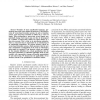Free Online Productivity Tools
i2Speak
i2Symbol
i2OCR
iTex2Img
iWeb2Print
iWeb2Shot
i2Type
iPdf2Split
iPdf2Merge
i2Bopomofo
i2Arabic
i2Style
i2Image
i2PDF
iLatex2Rtf
Sci2ools
ACSD
2010
IEEE
2010
IEEE
Order-Independence of Vector-Based Transition Systems
Abstract--Semantics of many specification languages, particularly those used in the domain of hardware, is described in terms of vector-based transition systems. In such a transition system, each macro-step transition is labeled by a vector of inputs. When performing a macro-step, several inputs may potentially change. Each macro-step can thus be decomposed in a number of micro-steps, taking one input change at a time into account. This is akin to an interleaving semantics, where a concurrent step is represented by an interleaving of tituting components. We present abstract criteria on vector-based transition systems, which guarantee that the next state computation is independent of the order in which these eps are executed. If our abstract criteria are satisfied by the semantic definition of a certain specification, then its state-space generation or exploration algorithm needs to only consider one representative among all possible permutations of such micro-steps. We demonstrate the ...
| Added | 10 Feb 2011 |
| Updated | 10 Feb 2011 |
| Type | Journal |
| Year | 2010 |
| Where | ACSD |
| Authors | Matthias Raffelsieper, Mohammad Reza Mousavi, Hans Zantema |
Comments (0)

